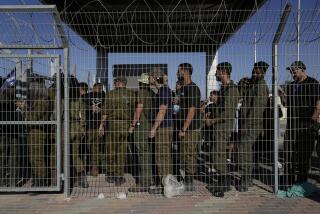Hometown Comes to Defense of Unit at Heart of Abuse Case
CRESAPTOWN, Md. — Carl Verner, who fought in World War II and Korea, was at the bar of the Eagles lodge early Saturday, drinking a Diet Pepsi and talking, like everyone else in town, about reports from Iraq that members of the local Army Reserve unit were being investigated in connection with abuse of Iraqi prisoners.
“My biggest point is that I don’t condone something like this,” said Verner, 74, “but we have a lot of respect and pride in this unit here and it’s hard for me to believe they’d be guilty. Who ... do you blame? Maybe our guys were being subjected to something they weren’t trained and prepared for.”
Bill Hendrick, sitting next to him, nodded. “I only know what’s on TV,” he said. “These fellas have come in here from time to time. They’re a good bunch, very military. And I know. I was in the Air Force. They don’t seem the type to beat up on prisoners.”
The 180 Army reservists of the 372nd Military Police Company, headquartered in this small town in the hollows of the Allegheny Mountains, mobilized for duty in Iraq in February 2003. They were sent off with a parade, American flags flying on the porches of the wood-frame homes on Route 220, which serves as Cresaptown’s main street. They went through the war with no fatalities.
Then late last week, after the CBS program “60 Minutes II” broadcast pictures of members of the 372nd apparently humiliating and abusing prisoners, Cresaptown’s 2,000 residents learned on TV that it was six members of the local unit who were facing criminal prosecution on charges that include indecent acts, cruelty, battery, dereliction of duty and conspiracy to maltreat prisoners.
“This is a real black mark for the unit,” said Kristie Gallagher of Winchester, Va., whose husband, Jason, is a sergeant with the 372nd in Iraq. She wears a T-shirt that says, “My Husband is Serving our Country.”
“I’m very upset. It’s also a black mark on Jason, even though he wasn’t involved in any of this, because it reflects badly on the majority like him who are doing their jobs honorably.”
Jennifer Bird, the wife of another sergeant, said her husband e-mailed her from Iraq a few months ago, saying “something was going on that I could expect to read about in the news sometime. I think this is really awful. We went over there to do good and things like this just make everyone hate us.”
Some family members, who met Saturday at the Army Reserve armory in a support group session scheduled before the scandal became public, said the reservists were under great stress and were doing a job not all had been trained to do. The unit finished its yearlong tour of duty in March but has since been extended twice, they said.
“What I wanted to find out at the meeting is why our soldiers don’t have what they need in Iraq,” said Lora Maddas of Unionville, Md. “My cousin says he and the other soldiers don’t have night-vision goggles, adequate firepower or proper communications equipment. He’s riding as an armed escort in the cab of tankers driven by foreign contract workers who don’t speak English.”
Most of the family members at the meeting either declined to talk to reporters or said they had no comment on the charges. (Lt. Gen. James R. Helmly, chief of the Army Reserve, met with the families, Associated Press reported.)
The military has identified only two of those charged: Staff Sgt. Ivan “Chip” Frederick II and Sgt. Javal Davis, neither of whom is from Cresaptown. The alleged offenses took place at Abu Ghraib prison, seven miles west of Baghdad, in November and December. They were originally revealed by a soldier in the unit who complained to superiors, an Army spokesman said.
In addition to the six soldiers facing criminal prosecution that could lead to prison terms, eight others are being investigated on lesser charges that could result in administrative discipline.
Three others not with the 372nd, including Brig. Gen. Janis Karpinski, the commander at Abu Ghraib, are also the subject of an inquiry. All 17 have been relieved of duty at the prison.
The pictures shown on “60 Minutes II,” which since have been broadcast throughout the Arab world to angry condemnation, showed naked Iraqi detainees forced into sexually abusive positions, American soldiers giving a thumbs-up sign as prisoners were being humiliated, and a hooded prisoner attached to wires while standing on a box. He reportedly was told that he would be electrocuted if he fell off the box.
President Bush, vowing that any soldier found guilty would be punished, said Friday: “I share a deep disgust that those prisoners were treated the way they were treated. Their treatment does not reflect the nature of the American people.”
Not everyone in Cresaptown shares the revulsion. “I think we ought to either turn our troops loose to do the job or bring them home,” said Randy Shrout, a machinist. “Our guys are getting killed over there, and we want to court-martial them just because they pulled some Iraqi’s pants off?”
“Honesty, I’d be all for bringing our boys home and letting the Iraqis just fight their civil war,” said Herman Fiorita, who runs a vegetable stand on Route 220. “If we’re going to crucify our soldiers on some technicality of mistreatment, how can you expect them to do the job they were sent to do?”
More to Read
Sign up for Essential California
The most important California stories and recommendations in your inbox every morning.
You may occasionally receive promotional content from the Los Angeles Times.










